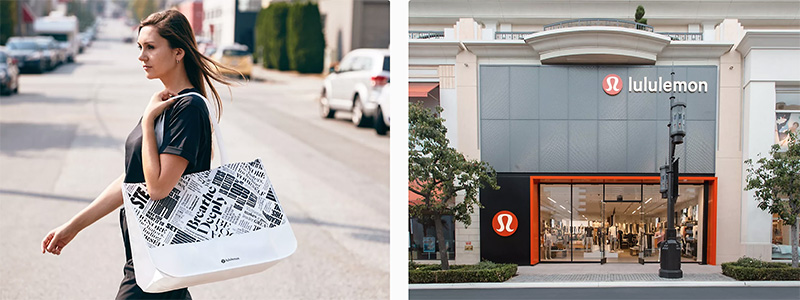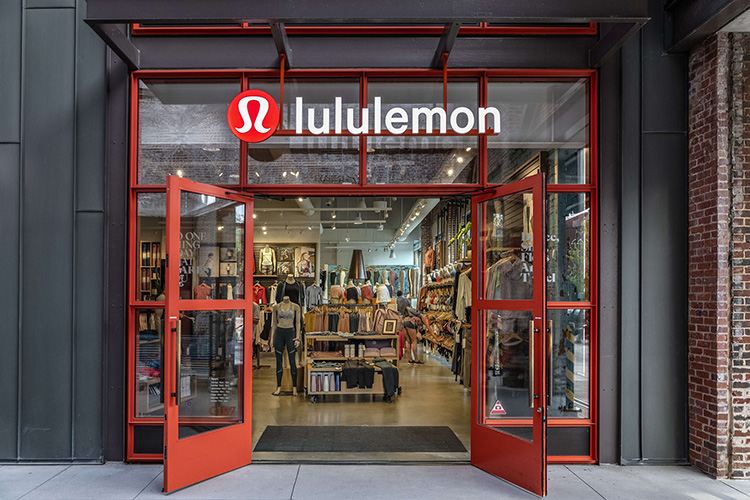Despite explosive online growth in recent years and its acquisition of the Mirror at-home fitness platform, Celeste Burgoyne, Lululemon’s president, Americas, and global guest innovation, at the virtual NRF Big Show stressed how critical physical stores are to driving the customer experience.
“There’s a real behavior shift to digital,” said Burgoyne. “That is real, and we do not believe that will go away. Yet, we believe strongly that the physical stores and our physical manifestation are still really, really important.”
In the first nine months of 2020, Lululemon’s direct-to-consumer (DTC) sales, representing those from its website or mobile app, vaulted 105 percent to $710.4 million. As a percent of sales, DTC sales accounted for 51.8 percent of sales in the nine months against 26.1 percent in the same period a year ago.
The DTC gain was partly because temporary closures impacted in-store sales due to COVID-19, reduced operating hours and restricted guest occupancy levels.
Burgoyne also said its growth reflected the payback from Lululemon’s three years of digital investments that supported extensive omnichannel offerings. She said, “COVID has shifted the world in some ways and has allowed us to take advantage of all the investments we’ve made in our digital ecosystem and leaning into our omnichannel strength. That has been one area that we have pushed into leveraging physical and digital.”
Emphasizing the safety of its employees and customers, Burgoyne said the performance of services – online ordering with two-hour pickup – in played a significant role in helping to move its on-trend merchandise during the holiday selling season. She said, “It was exciting to see our ability to leverage our physical stores and the great teams we have working in our stores to be able to fill buy online pick up in-store and curbside in such a fantastic way.”

She also highlighted a strong response to Lululemon’s “virtual waitlist” that keeps customers from having to stand outside of stores before entering. The feature, she said, “allows our guests to not stand in front of our stores and wait for 30, 45, 60 minutes but allows them to put their name in the queue and fulfill all their other needs, and we’ll text them when ready. Just a way to respect their time.”
Also introduced early on during the pandemic was Lululemon’s “digital educator” program, which enables store educators to video chat online. Said Burgoyne, “It helps us bridge that experience and allows us to have our educators be at the center of both the physical and the digital experience. On Black Friday alone, we had over 4,000 live video appointments with our digital educators. So, really, really fun.”
The retailer also expanded its use of seasonal pop-ups to support holiday selling in 2020 to 106 locations. Burgoyne added, “We also opened seasonal stores in existing malls or close to other stores to have more capacity for guests. We had some of our key centers where we operated two stores to ensure that customers were able to have the ease they needed to get in and get out.”
Asked about last year’s $500 acquisition of Mirror, Burgoyne noted that Mirror’s founder, Brynn Putnam, had owned a physical studio in New York City and had been a former Lululemon ambassador. She said the platform provides Lululemon an opportunity to tap into the at-home fitness trend that was accelerated by the pandemic and further engage with its fans inside their homes.
“We see the at-home fitness trend just beginning. We’re excited about what Mirror and Lululemon together can create when we think about bringing fitness and mindfulness to homes across the world,” said Burgoyne.
In the fourth quarter, Lululemon made Mirror available on its website and 18 stores in the U.S.

“Our educators and our guests in those stores have enjoyed having Mirror as a part of the guest experience. We’re learning so much through that pilot,” said Burgoyne.
“In 2021, we’ll bring more integration, specifically into our physical channels, so we’re excited about what 2020 taught us and how we will continue to move into this partnership and integration in 2021 as we roll up to more stores.”
Burgoyne added that while Lululemon believes physical stores are “as important as ever” because of the physical connections possible with customers, the retailer is focused on understanding how its physical store experience is evolving to complement increased online engagement.
“We will continue to lean into physical. And as we think of physical, understanding how it can shift and change over the next five years,” said Burgoyne. “We’re in that work to determine what we need in those physical stores, our physical experiences and the physical interactions to be, and how do we leverage our strengths within that. And we have such strength in physical from the quality of the people we have work in our stores, the quality of the connections we have in our communities and the guest interactions that we’re able to create. We’re excited to see how we will continue to evolve that physical experience.”
Photos courtesy Lululemon
















